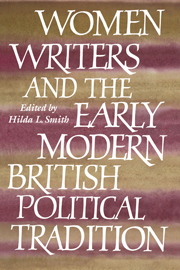Book contents
- Frontmatter
- Contents
- List of contributors
- Preface
- Introduction: Women, intellect, and politics: their intersection in seventeenth-century England
- Part I Women's political writings, 1400–1690
- Introduction to Part I
- 1 Christine de Pizan and the origins of peace theory
- 2 Political thought/political action: Margaret Cavendish's Hobbesian dilemma
- 3 Women's public political voice in England: 1640–1740
- 4 Contextualizing Aphra Behn: plays, politics, and party, 1679–1689
- Part II Women's political and philosophical writings, 1690–1800
- Part III The intellectual context and economic setting for early modern women
- Part IV Early modern legal and political prescriptions for women
- Conclusion: women's writing, women's standing: theory and politics in the early modern period
- Index
Introduction to Part I
from Part I - Women's political writings, 1400–1690
Published online by Cambridge University Press: 04 August 2010
- Frontmatter
- Contents
- List of contributors
- Preface
- Introduction: Women, intellect, and politics: their intersection in seventeenth-century England
- Part I Women's political writings, 1400–1690
- Introduction to Part I
- 1 Christine de Pizan and the origins of peace theory
- 2 Political thought/political action: Margaret Cavendish's Hobbesian dilemma
- 3 Women's public political voice in England: 1640–1740
- 4 Contextualizing Aphra Behn: plays, politics, and party, 1679–1689
- Part II Women's political and philosophical writings, 1690–1800
- Part III The intellectual context and economic setting for early modern women
- Part IV Early modern legal and political prescriptions for women
- Conclusion: women's writing, women's standing: theory and politics in the early modern period
- Index
Summary
Women's political expressions took disparate forms from the late medieval period through the seventeenth century, as these chapters make clear. In the early fifteenth century, Christine de Pizan, while today remembered primarily for her writings about women (especially The City of Ladies), wrote a range of political works for a largely aristocratic audience on statecraft, military strategy, the nature of war, and approaches to peace. Margaret Cavendish, duchess of Newcastle, while remembered for her scientific writings and works of fantasy (as well as her standing as an intellectual eccentric among the English aristocracy) in the middle of the seventeenth century also characterized the nature of the state in general and royal government in particular. Further, a range of genres (including prophecy, political tracts, and advice to political leaders) documents the growing political voice of women following 1640. Thus Aphra Behn's drama displayed not only her well-known Tory loyalties but her clear and purposeful use of past events (most often from the Exclusion Crisis of 1679–81) to illustrate the perfidy of the Whigs and the moral qualities of her Tory heroes.
Berenice Carroll's treatment of Christine de Pizan greatly expands our understanding of Christine's corpus. While there has been recent scholarship on her political thought, little of this scholarship has seeped into the broader academic assessment of her importance.
- Type
- Chapter
- Information
- Publisher: Cambridge University PressPrint publication year: 1998

